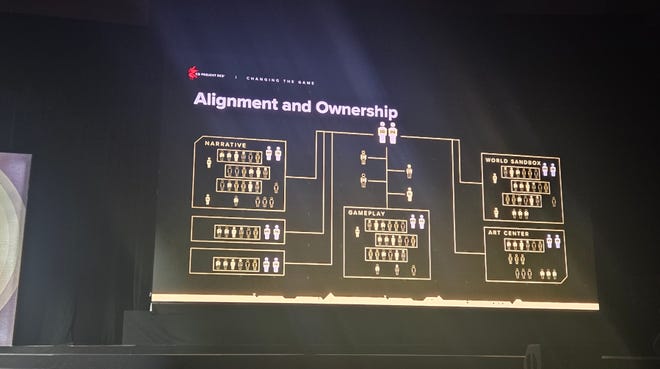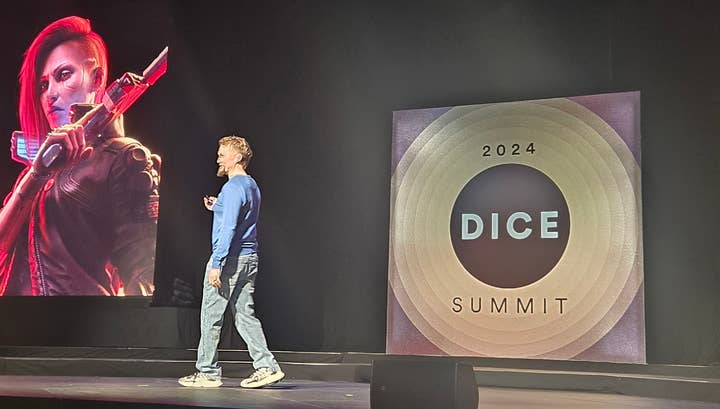The reorganization behind rescuing Cyberpunk 2077
At DICE 2024, CD Projekt Red's Gabe Amatangelo said "the idea was to distribute ownership, empower people"
Sign up for the GI Daily here to get the biggest news straight to your inbox
CD Projekt Red game director Gabe Amantangelo began his DICE 2024 keynote last week with an anecdote. He said that some months after the game's release, a local cafe staffer in Poland expressed concerns with the rocky launch of Cyberpunk 2077, in which she asked him, "What happened?"
Amantangelo admitted that given the game's turnaround and success, it's something that people can laugh about now.
The game director highlighted some of the pressures the Polish game developer faced regarding the release and post-release of the futuristic RPG.
"If you take it back to my colleagues, [they were] sort of kids out of college," he said. "My first job [was] working on this for four or five years, and you've got the pressures for trauma in the office. But also out of the office, your friends are asking you how are you doing now? That was the setting; there was a lot, in and out of the office. There's a lot of external negativity and trauma overall."
Amantangelo's keynote then turned to the studio, focusing on its staff's motivation and changing its development business operations.Among those points was restructuring how CD Projekt Red worked across its developmental departments. Having identified a significant pain point, Amantangelo said that the next challenge was implementing a pipeline.
"We had different product areas that we split up. We had the narrative area, the gameplay area, the world sandbox, and the arts center," he explained. "We also had other [areas] to deal with specific stuff, and we put a product owner in each one that then would be able to make [decision] calls."
He said that if a department head made a decision that conflicted with another lead's plan, this would create a conflict. Amantangelo explained that the next challenge was implementing a pipeline, allowing department heads to resolve conflicts more effectively during development. The game director says that the resolution was to allow his role to be replicated.

For example, the game director would oversee the operations of narrative design, and the president would be in charge of world sandbox design. Meanwhile, both would supervise a team of department leads who had decision-making power for the gameplay division of Cyberpunk 2077.
Amantangelo highlighted that this new organizational structure helped the studio to release the Cyberpunk 2077 2.0 update and the Phantom Liberty DLC in 2023.
"This setup is aspirational, and it illustrated that we were always in this form, but the idea was to distribute ownership, empower people, and make sure that we got a line," he said. "The producers, being a partner in every area, would help with managing the task of making sure that everyone's getting together, [as well as] seeing if there's a misalignment on something, raising a hand for everyone [and] bringing my attention to it."
Amantangelo explained that the new alignment and ownership organization also created a better method of collaboration for the studio's various departments.
"When we try to get the cross-discipline scenes together, we try to get one of every discipline, and that wasn't always feasible. Why not have enough audio designers for every single cut scene? Why not have enough artists around?" he said. "The discipline leads would [ensure] the quality of level design, from one area to the other, the quality of the gameplay, from one area to the other, the environment for the quality; they give the quality checks."
The game director added that the revamped organization model also created a more effective communication network across departments. It also allowed the dev team to identify what key factors helped turn around the game.
Amantangelo said, "We did a kind of a retrospective afterward. Everyone puts on the board, what they think, contributed the biggest contributions to the success in turning around the product. I saw some distributed ownership, alignment, cross-functional teams, and QA integration was a big one getting closer to those cross-functional teams."
He explained that the categories that were identified could be continued to their following product as well.
"One thing going forward we want to do is when we start establishing pipelines; we get QA very much involved at the early stages of pipelines playing the game, [because] playing the game is a huge one," the game director said. "We hear about that in a lot of different products; play your game, giving it the context of knowing what your piece of art, asset, and where the gameplay sits."
He continued, "How do you do that when everyone's got a bunch of stuff and they're very passionate about their work and want to put all their time into their craft? Telling them to take a step away and play it sometimes is challenging even though everyone knows the benefit of it."
Near the conclusion of his keynote, the game director explained that a willingness to adapt was crucial to Cyberpunk 2077's improvement.
"We went through a rough loss [and] humbling. We were all in a disposition and mentality [where] okay, all right, obviously, some things we didn't do right. What do we need to do to change?
"That willingness to change all this together to me was like there was a combined purpose, and I think this is a quintessential part of us being able to turn around trust and trusting each other's abilities and talents."
He concluded his keynote by acknowledging the game's userbase and popularity as a part of its success.
"The players believing us, sticking with us, and giving us a second chance was huge. I think players, [which] we can agree about, what they want to say is a very important part of this."
Sign up for the GI Daily here to get the biggest news straight to your inbox

